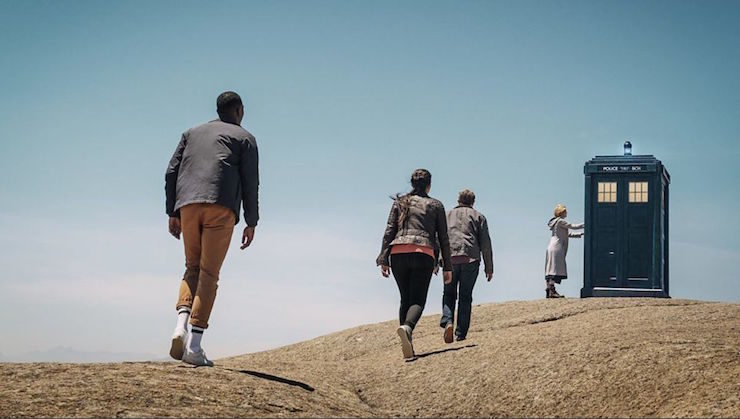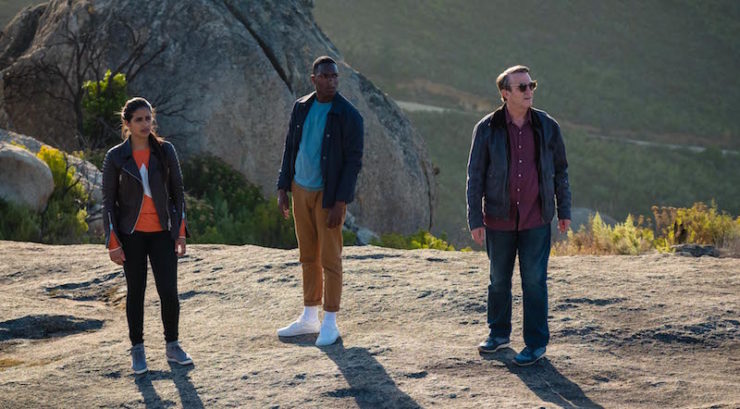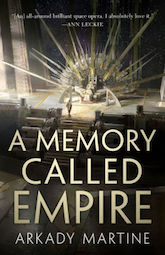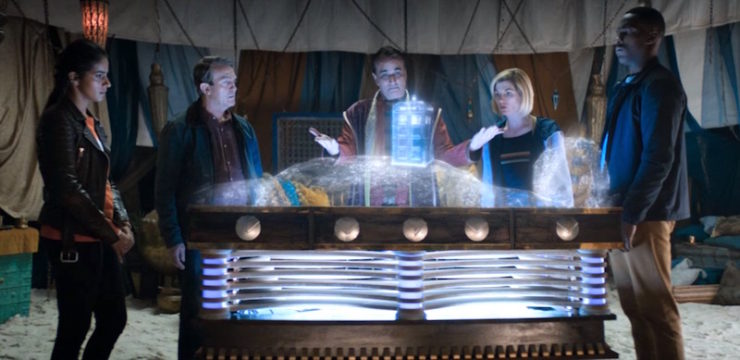With a brand new season underway, Doctor Who is in the process of redefining its tone and introducing itself to a new set of fans. “The Ghost Monument” was their second chance to show us what they’ve got up their collective sleeves.
We also get our first glimpse of a lovely blue box…
Summary
Ryan and Graham wake up on the ship of a man named Epzo, and the Doctor and Yas wake up on the ship of a woman named Angstrom. It turns out that both ships are headed for a planet named Desolation, the end of a race known as the Rally of the Twelve Galaxies. Epzo and Angstrom are the last competitors, and they learn that they must traverse the planet Desolation and reach an object known as the “Ghost Monument” in order to win. The Doctor quickly realizes that said monument is her TARDIS, and sets out with Ryan, Graham, and Yas to find it. As they explore the terrain, the Doctor learns that the planet was populated by scientists who were forced by the Stenza to create terrible weapons. This has killed most life on the planet, leaving behind only flesh-eating water and all the weapons they created.
The group reaches ruins which are now only populated by sniper-bots. Ryan tries to shoot them, against the Doctor’s wishes, and only succeeds in drawing more of them out. The Doctor uses an EMP to disable them briefly and the group heads underground and learns more about the scientists who worked on the planet. They get to know the two competitors better; Epzo is the self-interested sort who trusts no one and wants to win to prove himself; Angstrom’s people were ethnically cleansed by the Stenza and she wants to win to be reunited with her family in comfort.
The Doctor and friends manage to avoid or destroy the planet’s most lethal creations, and make it to the end of the race. Angstrom and Epzo argue who should be the victor, but the Doctor convinces them to enter the victor’s tent together. Ilin, the race’s overseer (and previous winner) insists that they cannot have two winners, but after Epzo and Angstrom threaten him, he relents and allows a joint victory. They are teleported off the planet before they can demand that the Doctor and friends are taken with them. The TARDIS is nowhere to be found, and the Doctor doesn’t believe they’ll last another day on the planet if they can’t leave. Thankfully, the TARDIS finally materializes, all shiny and restored. The Doctor invites her new friends in and promises to take them home.
Commentary

I’m going to say a thing that will make some people very happy and some people very angry, which is: this episode felt so much like a Russell T. Davies episode in all the ways that are guaranteed to make me happy.
Being a person who prefers the Davies to the Moffat era, I’ve missed the one-off plots and mad dash intrigue those first New Who seasons often brought to the table. The concept of a galactic “Amazing Race” where the winner ends up merely surviving comfortably in a rough and unhelpful universe is very similar to “The Long Game” of the Ninth Doctor’s tenure, and has that sharp and clear overlay of social commentary that Davies episodes excelled at. It’s not a complicated story by any means, but it’s an interesting adventure that is a perfect backdrop for the Doctor getting to know her new friends.
That being said, there are places where this story diverges that give us clues as to the show’s current tone—in a Davies episode, a man like Epzo would have likely either died due to his own awfulness, or stolen the race out from under Angstrom and continued to be a horrible person. Instead, the Doctor makes the insistence that they finish the race together, and Epzo finally agrees to that solution—he learns something in his time with the group and comes out of it a little less odious. If that’s the worldview that this iteration of Who wants to espouse, I’m all in; we’re living in an era when we could all do with the reminder that people can be taught and change for the better.
That being said, this episode also makes it obvious that Doctor Who is doing its best to court a brand new generation of fans for the show. There’s a lot of basic series mythology in this episode, which might seem overplayed to longer-standing fans; for example, it’s not hard to guess that the “ghost monument” is going to be the TARDIS a minute into its first mention by the race’s benefactor, Ilin. The Doctor reiterates her “no guns” policy in this episode—though this time she makes it a bit clearer precisely why, being that they complicate things rather than solve problems. (This is a useful layer of explanation, given that the Doctor as a character has always done things that are destructive, but has a very specific aversion to guns that is often just treated as a “code” rather than a specific opinion on them.) We get to see the interior of the TARDIS for the first time, and we get the first utterance that it’s not just a space… but a time ship. All of these things are being revealed for first-time fans; for anyone who knows the show, those notes will feel rote even if they are sweet.
We are learning more about the companions, particularly in the burgeoning relationship between Ryan and Graham, but that still stings given that their entire plot is being driven by the loss of Grace. The idea that Ryan’s grandmother has to die so that he can form a relationship with his step-grandfather feels hollow no matter how you cut it. This plot could have occurred just as easily without Grace’s demise, and their bonding is currently icing Yas out as the odd number in the companion set; it would be nice to get more deep character work with her rather than simple information (she lives at home, her sister wants her out so she can have her room), but seems to be playing the stable counterpart to Ryan and Graham’s tumultuous dynamic. Hopefully she’ll get her due down the line.

That said, all three of them are endearing from what we’ve seen so far. The Doctor serving as a sort of coach to help Ryan through his dyspraxia is already becoming a great focal point of their dynamic, and Graham is finding his inherent unflappability; the way he happily and pragmatically accepts the maybe-Audrey-Hepburn-or-Pythagoras’s sunglasses out of the Doctor’s pocket is truly precious. (She must have transferred all of the things hiding in her former coat’s pockets to the new coat, and I’m pretty sad that we missed out on that scene.) Each member of Team TARDIS has different strengths that the Doctor is happy to exploit, which still smacks of how the Fifth Doctor worked things out with a crew. What’s fun about it is that Yas’s strengths seem to be in overall big-picture mentality. She keeps tracks of all the bits and pieces that the Doctor is more liable to forget, being the magpie she is.
The end of the episode has a largely hopefully note about it, and there does seem to be a vague thread running through these stories that may pay off in the end. The planet Desolation was manned for a time by a crew of scientists who were forced to make terrible weapons, and those weapons were created for use by the Stenza—the species the Tzim-Sha came from. The race is called the “Rally of the Twelve Galaxies,” and the Twelve Galaxies themselves are the area where the Stenza conquered. What else did Desolation release on the galaxy? Will we continue to encounter the Stenza, and will it be up to Team TARDIS to stop them? There’s also reference to “The Timeless Child” of the Doctor’s past… which could be about any number of figures from the show’s history, or something that we’ve yet to see.
Buy the Book


A Memory Called Empire
We get one delightful gender slip-up from the Doctor that I personally adored; when the TARDIS is close to materializing, the Doctor says “Come to daddy… I mean, come to mummy!” That genuine moment of confusion is one of the realest responses to the regeneration that we’ve seen so far, particularly during a emotional plea to her ship and oldest traveling companion. (When my partner started transitioning, he often made this error too; you’re so accustomed to using words and phrases to describe yourself that it’s not uncommon to accidentally default to what’s familiar at the start.)
So far the responses to the new TARDIS interior seem largely negative, which is baffling to me. It’s more similar to the Davies-era again, more organic in feel, but with great bits of mechanized decor throughout. After a console room that was starting to feel more like a classroom during the Twelfth Doctor’s era, this is a welcome total shift, and it feels properly alien and new. Also the new opening credits are gorgeously trippy, and the new iteration of the theme gives the familiar intro an understated and mysterious vibe—in fact, the theme’s baseline sounds more like a proper pulse.
Can the Doctor get her new companions all home now? Well… we all know that TARDIS isn’t about to drop the newbies off after only one trip.
Little asides to shout out:
- The Doctor calls Ryan and Graham “my boys,” which is what Amy Pond used to call her and Rory, and it’s fine I just have something in my eye…
- Looking to Yas and saying “Oh Yas, I forgot you were there!” That might be the most Doctor thing that’s happened in the past three or four seasons of the show?
- It’s probably not intentional, but Yas’s sweater is incredibly similar to the shirt that Steven Universe wears every day, and that was cause enough for warm fuzzy feelings.
- Angstrom is queer and mentions having a wife (yay!). Who is dead (nooooo). This is again more in keeping with the Davies-era penchant for more casually integrating queerness into the Doctor Who universe without any sort of commentary.
- Venusian aikido is back! Though in a far less dramatic form than the Twelfth Doctor used it. Which makes it more scary, to be honest.
- BISCUIT COMPARTMENT IN THE CONSOLE THAT IS ALL GOOD NIGHT
Emmet Asher-Perrin wants a biscuit compartment. You can bug him on Twitter and Tumblr, and read more of her work here and elsewhere.










